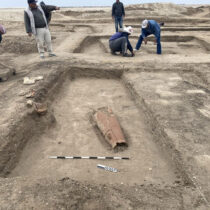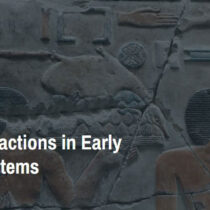The Department of Greek and Latin at University College London (UCL) is planning to host an international conference on 22-24 April 2015 on aspects of family law in the Ancient World. The term ‘family law’ is used as a convenient label for the range of legislation by which states seek to regulate the behaviour of ‘families’ and their members, and to define the boundaries between private and public responsibility for such matters. The conference will operate with a broad conception of the Ancient World, embracing a range of Mediterranean and Near and Middle Eastern cultures from the earliest times to late antiquity (including Egyptian, Old and Neo-Assyrian, New Babylonian, Persian, Ugarit, Alalakh, Greek and Roman).
Confirmed speakers include: Prof. Sophie Démare-Lafont (Paris), Prof. Edward Harris (Durham), Prof. Alberto Maffi (Milan), Prof. Paul Mitchell (UCL), Prof. Karen Radner (UCL), Prof. Lene Rubinstein (RHUL), and Prof. Jakub Urbanik (Warsaw).
Papers (in English, French, German or Italian) will be 20 minutes long, with 10 minutes for discussion. They will cover the four broad themes outlined below.
-Rights and obligations of kinship: legal obligations of parents (including ‘social parents’ such as guardians or stepparents) on the care and maintenance of children; legal obligations of children to care for elderly parents; extent of the state’s responsibility for the care and protection of vulnerable family members (e.g. widows, orphans, and the elderly); legal obligations for burial and commemorative rites.
-Marriage/divorce/adultery: eligibility for marriage; definitions of incest; procedures for a legally valid marriage; laws on dowry and marital property; definitions and legal consequences of adultery; attitudes to monogamy and polygamy, and to concubinage and other informal relationships; legal provision and procedures for divorce.
-Bastardy: distinctions between ‘legitimacy’ and ‘illegitimacy’ (bastardy); legal means of controlling or preventing illegitimate births (such as abortion or infanticide); ‘proof’ of legitimacy in cases of dispute; legitimation of children who were born illegitimate; legal relationship (including inheritance rights) between illegitimate children and their parents and other members of the birth family; effect of bastardy on civic status (citizenship, right to marry, right to own property, etc.).
-Property and inheritance: definitions of individual versus family property; types of property that could be inherited; entitlement to own and inherit property (including women’s rights); importance of patrilineal succession and male precedence; testamentary freedom; adoption of an heir.
A number of bursaries covering the conference fee for postgraduates and senior classicists (over 65s), to assist them to attend the event, will be offered.
Applications
Postgraduates are invited to submit an application in a word document of 250 words maximum indicating how the conference relates to their academic activity/ research interests and how the conference will benefit their work. Applications should be sent to the organisers at [email protected] by the end of February at the latest (eligibility will be checked at registration prior to reimbursement).
Queries at this address
Conference organisers:
Chris Carey (UCL)
Ifigeneia Giannadaki (UCL)
Brenda Griffith-Williams (UCL)





